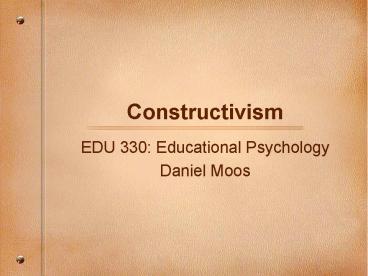Constructivism PowerPoint PPT Presentation
Title: Constructivism
1
Constructivism
- EDU 330 Educational Psychology
- Daniel Moos
2
Constructivism Introduction (I)
Which way is the bus below traveling? To the left
or to the right? Please do not share your answer
with anyone yet
3
Constructivism Introduction (II)
ES students all over the United States were shown
this picture and asked the same question. 90
of the students gave this answer "The bus is
traveling to the left." ??
When asked, "Why do you think the bus is
traveling to the left?" ??They answered
?"Because you can't see the door to get on the
bus."
4
Constructivism Introduction (III)
A father was listening to his oldest daughters
choir performance, during which they were singing
America the Beautiful. After hearing the line,
O beautiful for spacious skies, the fathers
youngest son asked, Why are they singing about
spaceship skies? "The law of gravity says no
fair jumping up without coming back down." "How
will that help?" -- Kindergarten student, when
the class was instructed to hold up two fingers
if any of them had to go to the bathroom. One
day the first grade teacher was reading the story
of Chicken Little to her class. She came to the
part of the story where Chicken Little tried to
warn the farmer. She read, '..... and so Chicken
Little went up to the farmer and said, 'The sky
is falling, the sky is falling!' The teacher
paused then asked the class, 'And what do you
think that farmer said?' One little girl raised
her hand and said, 'I think he said fill in
the blank! A talking chicken!'' The teacher was
unable to teach for the next 10 minutes.
5
Meaningful Learning Within aConstructivist
Framework
- Jerome Bruner and Discovery Learning An Early
Constructivist Perspective - ? Too much school learning emphasizes rote
learning that cannot be applied outside the
classroom - ? Children should be helped to discover how
ideas relate to each other and to existing
knowledge, and how to solve problems
6
Constructivism Assumptions, four facets (I)
- How do children construct knowledge?
- Learners construct knowledge that makes sense to
them.
- New learning depends on current understanding.
- Social interaction facilitates learning.
- The most meaningful learning takes place in
real-world tasks.
7
Constructivism Today
- Two Variations on a Constructivist Theme
- ? Cognitive Constructivism (Piaget)
- Emphasizes the development of meaningful
learning by focusing on the cognitive processes
that take place within individuals - ? Social Constructivism (Vygotsky)
- Emphasizes the development of meaningful
learning by focusing on culture and social
interactions
8
Constructivism Application to the classroom
- Provide learners with a varietyof examples and
representations of content.
- Connect content to the real world.
- Treat verbal explanations skeptically.
- Promote high levels of interaction.
- Make assessment an integral part of the
teaching-learning process.
9
Constructivism Limitations
- As with any theory, there are some limitations
you should be aware of... - Time consuming!
- Are all forms of understanding equally good?
- What of the reality independent of individual
understanding? - Provides theoretical explanation of individual
differences but, does it adequately provide
explanation of how to address these differences? - Does not address (or adequately) describe all
aspects of learning behaviorism,
information-processing, and social cognitive
theory have their place in educational psychology
as well!
10
Conceptual Change
- What is conceptual change?
- Learning that generally changes an existing
conception (i.e. idea, belief, way of thinking) - Think of a time when you experienced a
conceptual change. What was that change? What
led to that change? What do you think teachers
can do to support conceptual change?

